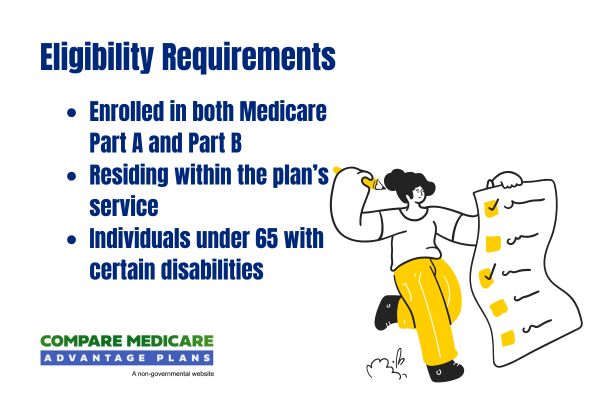United Healthcare Medicare Advantage Plans 2026
Curious about United Healthcare Medicare Advantage Plans
Key Takeaways
- UnitedHealthcare offers diverse Medicare Advantage Plans including HMO, PPO, and Special Needs Plans, each tailored to different healthcare needs.
- Medicare Advantage Plans often feature lower premiums, additional benefits, such as dental and vision coverage, and a maximum out-of-pocket limit, providing financial predictability compared to Original Medicare.
- Members benefit from extensive support resources, including the UCard® and UnitedHealthcare app, which facilitate easy access to plan services and prescription medications.
Compare Plans in One Step!
Enter Zip Code
Overview of UnitedHealthcare Medicare Advantage Plans

UnitedHealthcare offers a diverse portfolio of Medicare Advantage Plans, catering to a wide range of healthcare needs. These plans, often referred to as Medicare Advantage Part C, encompass Health Maintenance Organizations (HMO), Preferred Provider Organizations (PPO), and Special Needs Plans (SNPs). Each type of plan comes with its own set of features, designed to provide comprehensive coverage and additional benefits beyond what Original Medicare offers.
HMO plans generally require members to receive care within a specific network of doctors and hospitals, ensuring coordinated care through a primary care provider. PPO plans, on the other hand, offer greater flexibility by allowing members to see any doctor that accepts Medicare, though out-of-pocket costs may vary.
Special Needs Plans (SNPs) are tailored for individuals with specific diseases or characteristics, providing targeted care and benefits. Let’s take a closer look at each of these plans to understand their unique advantages.

HMO Plans
Health Maintenance Organization (HMO) plans are a popular choice within UnitedHealthcare’s Medicare Advantage portfolio. These plans require members to use a network of doctors and hospitals, which helps to keep costs predictable and often lower. Members must select a primary care provider (PCP) who will coordinate all their healthcare needs, from routine check-ups to specialist referrals. This structure ensures a cohesive approach to healthcare, making it easier for members to manage their health.
One of the significant benefits of HMO plans is the emphasis on preventive and comprehensive services. Regular doctor visits and screenings are covered, encouraging members to maintain their health proactively. While the network restrictions might seem limiting, the coordinated care model can lead to better health outcomes and lower out-of-pocket expenses.
PPO Plans
Preferred Provider Organization (PPO) plans offer a higher degree of flexibility compared to HMO plans. Members of a PPO plan can visit any healthcare provider that accepts Medicare, providing more freedom in choosing doctors and specialists. This flexibility, however, often comes with higher premiums, reflecting the broader network and fewer restrictions on care.
One of the standout features of PPO plans is the ability to see specialists without needing a referral from a primary care provider. This can simplify access to various healthcare services, making it an attractive option for those who value flexibility and direct access to specialists. While the costs may be higher, the convenience and expanded choices can be worth it for many beneficiaries.
Special Needs Plans (SNPs)
Special Needs Plans (SNPs) are a specialized type of Medicare Advantage plan designed to meet the unique needs of individuals with specific health conditions or characteristics. These plans include Dual Special Needs Plans (D-SNPs) for those eligible for both Medicare and Medicaid, and Chronic Special Needs Plans (C-SNPs) for individuals with certain chronic illnesses.
D-SNPs, in particular, are tailored to provide comprehensive care for dual-eligible members, integrating benefits from both programs to offer more coordinated and efficient healthcare services. These plans can be a lifeline for those with complex health needs, ensuring they receive the appropriate care and support tailored to their specific conditions.
Cost Comparisons: UnitedHealthcare Medicare Advantage vs. Original Medicare

When comparing UnitedHealthcare Medicare Advantage Plans to Original Medicare, cost is a significant factor. Medicare Advantage plans often feature lower premiums, with many potentially offering $0 premium options. This can make them an attractive choice for budget-conscious beneficiaries. However, it’s essential to consider other out-of-pocket costs, such as deductibles and copayments, which can vary between plans.
Unlike Original Medicare, which has a standard deductible and coinsurance for each service, Medicare Advantage plans may offer lower or no deductibles, and copayments that can reduce overall costs. Additionally, Medicare Advantage plans have a maximum out-of-pocket limit, providing a cap on annual expenses, which Original Medicare does not offer. This feature can offer significant financial protection, especially for those with high medical expenses.
The choice between Original Medicare and Medicare Advantage can significantly impact your out-of-pocket costs and the range of services available. While Original Medicare offers a broader choice of providers, Medicare Advantage plans often include additional benefits like vision, dental, and hearing coverage, which can offset some of the higher out-of-pocket costs.
Prescription Drug Coverage in UnitedHealthcare Medicare Advantage Plans

UnitedHealthcare Medicare Advantage Plans provide extensive prescription drug coverage, a significant advantage over Original Medicare. These plans include coverage for a wide range of medications, helping to reduce the financial burden on beneficiaries. During the catastrophic coverage stage, there is no cost share for all drugs covered by Medicare Part D, providing substantial savings for those with high medication needs.
One notable benefit is the cost cap on insulin, where a 1-month supply can cost $35 or less. This makes managing chronic conditions like diabetes more affordable.
Additionally, Special Needs Plans (SNPs) include tailored prescription drug coverage to meet the unique needs of their members, ensuring comprehensive medication management.
Dental, Vision, and Hearing Benefits
One of the standout features of UnitedHealthcare Medicare Advantage Plans is the inclusion of extra benefits that Original Medicare does not cover. These plans often provide dental, vision, and hearing benefits, enhancing the overall healthcare experience for members.
This comprehensive coverage can significantly reduce out-of-pocket expenses for routine and specialized care, making it easier for beneficiaries to maintain their overall health.
Dental Coverage
Dental coverage under UnitedHealthcare Medicare Advantage Plans includes a range of preventive services, such as cleanings and check-ups, often covered without any out-of-pocket costs. This focus on preventive care helps members maintain good oral health and detect issues early when they are easier to treat.
In addition to preventive services, these plans also cover comprehensive dental care, including fillings, extractions, and dentures. This comprehensive approach ensures that members have access to essential dental treatments, supporting their overall well-being.
Vision Benefits
Vision benefits are another highlight of UnitedHealthcare Medicare Advantage Plans. Members can receive eye exams with a $0 copay, making routine vision care accessible and affordable. Regular eye exams are crucial for detecting vision problems and other health issues early, including vision benefits covered services.
Furthermore, these plans offer eyewear allowances, ranging from $100 to $400, to help cover the costs of glasses or contact lenses. This benefit ensures that members can obtain the corrective lenses they need without incurring significant expenses.
Hearing Benefits
Hearing benefits under UnitedHealthcare Medicare Advantage Plans include coverage for routine hearing exams at no additional cost. Regular hearing check-ups are vital for maintaining auditory health and identifying issues early.
Additionally, these plans offer discounts on premium hearing aids, making them more affordable for members. This financial assistance can significantly improve the quality of life for those with hearing impairments.
Accessing Care and Network Restrictions
Accessing care under UnitedHealthcare Medicare Advantage Plans involves understanding the network restrictions associated with your specific plan. Members are encouraged to use in-network providers to minimize out-of-pocket costs. This differs from Original Medicare, which allows beneficiaries to see any doctor that accepts Medicare. While this might seem limiting, the coordinated care within the network often leads to more streamlined and cost-effective healthcare.
For those enrolled in PPO plans, there is greater flexibility, allowing members to seek care from both in-network and out-of-network providers, though costs may vary. Importantly, emergency care services can be accessed without prior authorization, even outside of the plan’s network, ensuring that members receive timely and necessary treatment in urgent situations.
This balance of network usage and emergency flexibility helps maintain both cost control and access to essential services.
How to Qualify for UnitedHealthcare Medicare Advantage Plans

Qualifying for UnitedHealthcare Medicare Advantage Plans involves meeting specific eligibility criteria set by Medicare. Generally, individuals must be aged 65 or older and reside within the plan’s service area. Additionally, those under 65 with certain disabilities or chronic conditions may also qualify. It’s essential to verify these eligibility requirements to ensure you can enroll in the plan that best suits your needs.
For those interested in Special Needs Plans (SNPs), additional criteria apply. Dual Special Needs Plans (D-SNPs) cater to individuals eligible for both Medicare and Medicaid, while Chronic Special Needs Plans (C-SNPs) are designed for those with specific chronic illnesses. These plans offer tailored benefits that address the unique healthcare needs of these populations, ensuring comprehensive and coordinated care.
Annual Wellness Visits and Preventive Services
Annual wellness visits are a cornerstone of preventive care under UnitedHealthcare Medicare Advantage Plans. These visits focus on reviewing medical history, current medications, and potential health risks, rather than conducting a comprehensive physical exam. This proactive approach helps in identifying health issues early and setting personalized health goals.
During the annual wellness visit, patients work with their healthcare providers to create a personalized wellness plan, which can include recommendations for screenings, vaccinations, and lifestyle changes. UnitedHealthcare also offers in-home health assessments through their HouseCalls program, providing a convenient option for those who prefer or need it.
This emphasis on preventive care can lead to better health outcomes and reduce the need for more extensive medical interventions.
Comparing UnitedHealthcare Medicare Advantage Plans to Original Medicare

UnitedHealthcare Medicare Advantage Plans combine the benefits of Original Medicare Part A and Part B into a single plan, often adding extra perks like dental, vision, and hearing benefits. This consolidation simplifies coverage and can make managing healthcare needs more straightforward. These additional benefits can significantly enhance the overall healthcare experience compared to Original Medicare alone.
One of the key advantages of Medicare Advantage Plans is the potential for lower out-of-pocket expenses. Beneficiaries often find that their overall healthcare costs are reduced due to lower premiums, copayments, and the inclusion of an out-of-pocket maximum, which Original Medicare does not offer. This financial predictability is a significant benefit for many enrollees, especially with Advantage Part C Plans.
The trend towards Medicare Advantage Plans continues to grow, with more than half of eligible Medicare beneficiaries opting for these plans over Original Medicare. This shift highlights the value and satisfaction these plans provide, making them a compelling option for those seeking comprehensive and cost-effective healthcare coverage.
Member Resources and Support
UnitedHealthcare offers a robust support system for members, ensuring they have access to the resources they need. The UnitedHealthcare insurance company UCard® serves as both a member ID card and a gateway to various plan services, simplifying the management of benefits. Additionally, the UnitedHealthcare app provides quick access to plan details, coverage information, and pharmacy resources, making it easier for members to stay informed and manage their health.
With a network of over 65,000 pharmacy locations nationwide, members can conveniently fill their prescriptions. Utilizing a preferred network pharmacy can lead to additional savings on prescription drug costs, further enhancing the financial benefits of the plan.
These resources and supports are designed to make the healthcare experience as smooth and cost-effective as possible for members.
Emergencies and Referrals in UnitedHealthcare Medicare Advantage Plans
UnitedHealthcare Medicare Advantage Plans often require members to select a primary care provider (PCP) who coordinates their healthcare services. This coordination is crucial for managing referrals to specialists, ensuring that all aspects of a member’s care are integrated and streamlined. In UnitedHealthcare Navigate plans, having a PCP is essential for obtaining referrals within the network.
In emergencies, members can receive immediate care from any hospital or doctor, regardless of network affiliation, without needing a referral. However, it’s necessary to notify the plan about the emergency situation as soon as possible to ensure coverage for these services. This process ensures that members receive timely care while maintaining the integrity of their coordinated healthcare plan.
Summary
UnitedHealthcare Medicare Advantage Plans offer a comprehensive and flexible approach to healthcare, combining the benefits of Original Medicare with additional perks like dental, vision, and hearing coverage. These plans provide significant cost savings through lower premiums, copayments, and an out-of-pocket maximum, making them an attractive option for many beneficiaries. The emphasis on preventive care and the inclusion of extensive prescription drug coverage further enhance their value.
As you consider your healthcare options
Frequently Asked Questions
→ What types of UnitedHealthcare Medicare Advantage Plans are available?
UnitedHealthcare Medicare Advantage Plans include HMO, PPO, and Special Needs Plans (SNPs), providing diverse options to meet various healthcare requirements. Choose the one that best fits your needs for optimal health management.
→ How do HMO and PPO plans differ in terms of provider flexibility?
HMO plans limit members to a specific network and require a primary care provider for referrals, while PPO plans provide greater flexibility, allowing members to see any provider that accepts their insurance for a varying cost. This flexibility in PPO plans often comes with higher out-of-pocket expenses.
→ Are prescription drugs covered under UnitedHealthcare Medicare Advantage Plans?
Yes, UnitedHealthcare Medicare Advantage Plans cover prescription drugs, offering extensive coverage with cost caps for insulin and no cost share during the catastrophic coverage stage.
→ What additional benefits do UnitedHealthcare Medicare Advantage Plans offer?
UnitedHealthcare Medicare Advantage Plans offer additional benefits such as dental, vision, and hearing coverage, enhancing your overall healthcare experience beyond what Original Medicare provides.
→ How do I qualify for a UnitedHealthcare Medicare Advantage Plan?
To qualify for a UnitedHealthcare Medicare Advantage Plan, you generally need to be 65 or older and live within the plan’s service area. Certain plans, like Special Needs Plans, may have additional eligibility requirements based on health conditions or dual eligibility for Medicare and Medicaid.

UNITED HEALTHCARE MEDICARE ADVANTAGE PLAN BY STATE
Indiana
Iowa
Kansas
Kentucky
Louisiana
Maine
Maryland
Massachusetts
Michigan
Minnesota
Mississippi
Missouri
Montana
Nebraska
Nevada
New Hampshire
New Jersey
New Mexico
Rhode Island
ZRN Health & Financial Services, LLC, a Texas limited liability company



